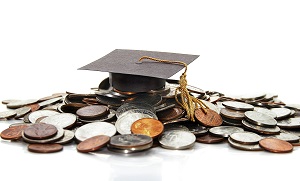.jpg) In today’s world, a college degree has become a necessity to acquire a good job. More often than not, students start college right after completing high school. This typically means they haven’t had much time to begin saving up for their higher education. Unless their parents were able to put money away for them, most students end up taking out student loans to pay for the bulk of their education. Then, when they complete college they have a large amount of debt waiting for them; and, if they are unable to find a good paying job right away, troubles can begin escalating quickly. It doesn’t take long for student loans and their interest rates to spiral out of control.
In today’s world, a college degree has become a necessity to acquire a good job. More often than not, students start college right after completing high school. This typically means they haven’t had much time to begin saving up for their higher education. Unless their parents were able to put money away for them, most students end up taking out student loans to pay for the bulk of their education. Then, when they complete college they have a large amount of debt waiting for them; and, if they are unable to find a good paying job right away, troubles can begin escalating quickly. It doesn’t take long for student loans and their interest rates to spiral out of control.
Lately there have been a lot of confusing messages related to student loans and bankruptcy. In a majority of cases, student loans are NOT dischargeable unless undue hardship can be proven to the court, which is very difficult to do. Here we will explain what needs to be done in order to prove to the courts that your student loans cause an “undue hardship” and also show how bankruptcy can help you even if you are unable to discharge those loans.
What Are The Steps I Need to Take To Try To Get My Student Loans Discharged?
The first step in attempting to discharge your student loans is to file a bankruptcy case. The second step, once the case is filed, is to file a lawsuit against each student loan company that you are asking the bankruptcy court to issue an order of discharge from. Remember, in order for the courts to issue a discharge, you must prove to them that your student loans cause an undue hardship for you and your dependents. If the bankruptcy court judge agrees with your position that the repayment of the student loan debt(s) would cause an undue hardship for you and your dependents, the court will issue an order discharging the student loan debts in the bankruptcy case. Once issued, you are not personally liable for the student loans- you win!
Why Is It So Hard To Discharge Student Loans?
The steps that you must take in order to attempt to discharge your student loans may not seem very difficult to do and well worth the effort in order to be freed of thousands of dollars of debt. However as we mentioned before, in a majority of cases, student loans are not dischargeable. One of the biggest reasons that student loans are not dischargeable is because “undue hardship” is a very vague term. It is very likely that your interpretation of undue hardship will vary greatly from the student loan companies’ interpretation and even the bankruptcy judge’s. We understand that a financial set back or unreasonably high living expenses on top you’re your student loans may seem like an undue hardship to you, but unfortunately the other parties involved will most likely not agree with that reasoning.
There certainly are cases that warrant a look into whether the student loan debtor may qualify for this discharge under “undue hardship”. A qualified bankruptcy lawyer can advise you on this and we encourage you to seek their help if you believe you may qualify. With all of this said, even if you do not qualify for a student loan discharge, bankruptcy can provide you the relief you need to get your finances back on track.
Bankruptcy Will Provide the Relief You Are Looking For
Even though it is likely that your student loan debt(s) are not considered an undue hardship for you and your dependents and the student loans won’t be discharged, a bankruptcy can still provide you with the financial help you need. Chapter 13 bankruptcy is a government sponsored debt consolidation plan with special rules that protect the debtor. Once you file for Chapter 13, your creditors will be barred from collecting from you – including student loan companies for as long as you are in your Chapter 13 case – up to five years. You will be required to make a monthly payment to a trustee, which will go towards all of your debts including your student loans. These monthly payments are based on what you can afford, therefore you will be relieved from your life of overwhelming debt almost instantly after the discharge is granted. At the end of your payment plan, whatever unsecured debts not paid off by the plan will be wiped out (i.e. credit card and medical bills). You will still be liable for your student loans, but you will no longer have the other debts to make payments to, therefore making it easier to pay your student loan payments.
As you can see, bankruptcy can provide you the relief from your student loans that you need. It may be unlikely to receive a discharge on your student loans, but you will receive relief from your other unsecured debts making your student loans easier to handle. We suggest that you consult with a bankruptcy attorney to see what options may be best for your situation.
For more information on bankruptcy and student loans, sign up for our e-newsletter or check out these blogs:



